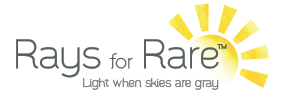Terms of Use
NON-DISCRIMINATION POLICY
Rays for Rare™ does not and shall not discriminate on the basis of race, color, religion, gender, age, national origin, disability, sexual orientation, or military status in any of its activities or operations. These activities include, but are not limited to: selection of volunteers and vendors and provision of services.
Rays for Rare™ is an Equal Employment Opportunity and Affirmative Action employer. We do not discriminate based on race, religion, color, national origin, gender, sexual orientation, age, status as a veteran, or disability.
DONOR POLICY
Donor Privacy
Rays for Rare™ will not sell, trade, rent or exchange its donor list and donor's personal information with any other organization. Rays for Rare™ will never send out mailings on behalf of other organizations. Donor information will be maintained in a password protected, secured database. Only authorized personnel will have access to this information and only for appropriate business purposes. This information is shared with board members and authorized staff, only on a confidential and need-to-know basis.
Donor Bill of Rights
This was created by the Association of Fundraising Professionals (AFP), the Association for Healthcare Philanthropy (AHP), the Council for Advancement and Support of Education (CASE), and the Giving Institute: Leading Consultants to Non-Profits.
Philanthropy is based on voluntary action for the common good. It is a tradition of giving and sharing that is primary to the quality of life. To ensure that philanthropy merits the respect and trust of the general public, and that donors and prospective donors can have full confidence in the nonprofit organizations and causes they are asked to support, we declare that all donors have these rights:
To be informed of the organization's mission, of the way the organization intends to use donated resources, and of its capacity to use donations effectively for their intended purposes. To be informed of the identity of those serving on the organization's governing board, and to expect the board to exercise prudent judgment in its stewardship responsibilities. To have access to the organization's most recent financial statements. To be assured their gifts will be used for the purposes for which they were given. To receive appropriate acknowledgement and recognition. To be assured that information about their donation is handled with respect and with confidentiality to the extent provided by law. To expect that all relationships with individuals representing organizations of interest to the donor will be professional in nature. To be informed whether those seeking donations are volunteers, employees of the organization or hired solicitors. To have the opportunity for their names to be deleted from mailing lists that an organization may intend to share. To feel free to ask questions when making a donation and to receive prompt, truthful and forthright answers.
